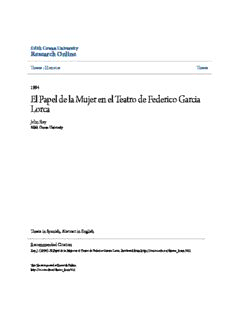
El Papel de la Mujer en el Teatro de Federico Garcia Lorca PDF
Preview El Papel de la Mujer en el Teatro de Federico Garcia Lorca
EEddiitthh CCoowwaann UUnniivveerrssiittyy RReesseeaarrcchh OOnnlliinnee Theses : Honours Theses 1994 EEll PPaappeell ddee llaa MMuujjeerr eenn eell TTeeaattrroo ddee FFeeddeerriiccoo GGaarrcciiaa LLoorrccaa John Rey Edith Cowan University Follow this and additional works at: https://ro.ecu.edu.au/theses_hons Part of the Spanish Literature Commons Thesis in Spanish, Abstract in English RReeccoommmmeennddeedd CCiittaattiioonn Rey, J. (1994). El Papel de la Mujer en el Teatro de Federico Garcia Lorca. https://ro.ecu.edu.au/ theses_hons/611 This Thesis is posted at Research Online. https://ro.ecu.edu.au/theses_hons/611 Edith Cowan University Copyright Warning You may print or download ONE copy of this document for the purpose of your own research or study. The University does not authorize you to copy, communicate or otherwise make available electronically to any other person any copyright material contained on this site. You are reminded of the following: Copyright owners are entitled to take legal action against persons who infringe their copyright. A reproduction of material that is protected by copyright may be a copyright infringement. Where the reproduction of such material is done without attribution of authorship, with false attribution of authorship or the authorship is treated in a derogatory manner, this may be a breach of the author’s moral rights contained in Part IX of the Copyright Act 1968 (Cth). Courts have the power to impose a wide range of civil and criminal sanctions for infringement of copyright, infringement of moral rights and other offences under the Copyright Act 1968 (Cth). Higher penalties may apply, and higher damages may be awarded, for offences and infringements involving the conversion of material into digital or electronic form . EL papel de la mujer en el teatro de Federico Garcia Lorca by John Rey at Edith Cowan University This thesis is presented for an Honours Degree of Bachelor of Arts at the School of Language, Literature and Media Studies, Faculty of Arts. November, 1994 USE OF THESIS The Use of Thesis statement is not included in this version of the thesis. Declaration I certify that this thesis does not incorporate without acknowledgement any material previously submitted for a degree or diploma in any institution of higher education; and that, to the best of my ability and belief, it does not contain any material previously published or written by any other person except where due reference is made in the text. A mis padres e hija, Rebecca. INDICE Acknowledgements 1 Abstract 2 Introducci6n 3 Capftulo Primero: Mariana Pineda 11 Capitulo Segundo: Bodas de sangre 26 Capftulo Tercero: Yerma 46 Capftulo Cuarto: Dona Rosita la soltera 63 Capitulo Quinto: La casa de Bernarda Alba 79 Conclusi6n 101 Cronologia 112 Bibliografia 114 - I - Acknowledgements I would like to thank, first and foremost, my supervisor, Francisco Martinez, for guiding me through the maze of academic research techniques and for helping me to develop my writing style. I am also grateful to Javier Albillos, for the unconditional access he gave me to his extensive private library, an invaluable aid for this study. - 2- ABSTRACT Federico Garcfa Lorca is considered by many as the Spanish playwright with the strongest and acutest social conscience of the twentieth century in his country, especially regarding the plight of Spanish women. In this thesis, his fight for women's rights, his understanding of their frustrations, feelings, sufferings, their social predicament in an unchanging and anachronistic society will be explored by focusing on Lorca's commitment to changing the social status quo. A link will be established between Lorca's work and the influence that earlier playwrights had on him. Many Spanish playwrights were among the first in Europe to spouse Erasmus' ideas advocating the liberation of women. One thing these dramatists believed in unanimously was a woman's libertad de amar (freedom to love). Using his theatre as a platform to fight social injustice against women, Lorca became a thorn in the social conscience of the leaders of his country, to the extent that his enemies, mainly the· Guardia Civil and the Palange, marked him for death. Federico Garcfa Lorca was assassinated on August 1936, at the age of thirty-eight. - 3 - El teatro es esa poes(a que se eleva del libro y se convierte en humana F. G. L. INTRODUCCION En lfnea con las "novelas de la gente" de Emile Erckmann y Alexandre Chatrian que condenan la injusticia social, el teatro de Federico Garcia Lorca ataca la sociedad espaftola, poniendo el sufrimiento ffsico y psicol6gico de la mujer ... bajo el microscopio para examinarlos minuciosamente. La idea central en el teatro lorquiano es el tema de la frustraci6n en la mujer y su conflicto con la sociedad. Este tema ya habfa sido introducido en el teatro espaftol por otros dramaturgos espaftoles desde tiempo inmemorial. El humanista Erasmo de Rotterdam (1466-1536) ejerci6 gran influencia para cambiar la actitud de la sociedad hacia la mujer. Americo Castrol califica este ideal m~s humano de la mujer de Erasmo como: "Un movimiento en favor de la dignificaci6n de la mujer." Las ideas de Erasmo se e'xtendieron por todos los cfrculos iluminados de Europa. En el centro de este movimiento estaba Catalina de Arag6n, la primera mujer de Enrique VIII de Inglaterra. Su madre, Isabel la Cat6lica, se habfa preocupado para que Catalina y sus hermanas fueran bien educadas, por lo que obtuvo los servicios de dos humanistas italianos, Antonio y Alessandro Geraldini. Catalina adquiri6 una gran cultura que sorprendi6 a Tom~s Moro e incluso al mismo Erasmo. Catalina pidi6 a
Description: